- Home
- Arthur Conan Doyle
The Memoirs of Sherlock Holmes
The Memoirs of Sherlock Holmes Read online
Produced by Angela M. Cable
MEMOIRS OF SHERLOCK HOLMES
by Sir Arthur Conan Doyle
Adventure I. Silver Blaze
"I am afraid, Watson, that I shall have to go," said Holmes, as we satdown together to our breakfast one morning.
"Go! Where to?"
"To Dartmoor; to King's Pyland."
I was not surprised. Indeed, my only wonder was that he had not alreadybeen mixed up in this extraordinary case, which was the one topic ofconversation through the length and breadth of England. For a whole daymy companion had rambled about the room with his chin upon his chest andhis brows knitted, charging and recharging his pipe with the strongestblack tobacco, and absolutely deaf to any of my questions or remarks.Fresh editions of every paper had been sent up by our news agent, onlyto be glanced over and tossed down into a corner. Yet, silent as he was,I knew perfectly well what it was over which he was brooding. There wasbut one problem before the public which could challenge his powers ofanalysis, and that was the singular disappearance of the favorite forthe Wessex Cup, and the tragic murder of its trainer. When, therefore,he suddenly announced his intention of setting out for the scene of thedrama it was only what I had both expected and hoped for.
"I should be most happy to go down with you if I should not be in theway," said I.
"My dear Watson, you would confer a great favor upon me by coming. AndI think that your time will not be misspent, for there are points aboutthe case which promise to make it an absolutely unique one. We have, Ithink, just time to catch our train at Paddington, and I will go furtherinto the matter upon our journey. You would oblige me by bringing withyou your very excellent field-glass."
And so it happened that an hour or so later I found myself in thecorner of a first-class carriage flying along en route for Exeter, whileSherlock Holmes, with his sharp, eager face framed in his ear-flappedtravelling-cap, dipped rapidly into the bundle of fresh papers which hehad procured at Paddington. We had left Reading far behind us beforehe thrust the last one of them under the seat, and offered me hiscigar-case.
"We are going well," said he, looking out the window and glancing at hiswatch. "Our rate at present is fifty-three and a half miles an hour."
"I have not observed the quarter-mile posts," said I.
"Nor have I. But the telegraph posts upon this line are sixty yardsapart, and the calculation is a simple one. I presume that youhave looked into this matter of the murder of John Straker and thedisappearance of Silver Blaze?"
"I have seen what the Telegraph and the Chronicle have to say."
"It is one of those cases where the art of the reasoner should beused rather for the sifting of details than for the acquiring of freshevidence. The tragedy has been so uncommon, so complete and of suchpersonal importance to so many people, that we are suffering from aplethora of surmise, conjecture, and hypothesis. The difficulty is todetach the framework of fact--of absolute undeniable fact--from theembellishments of theorists and reporters. Then, having establishedourselves upon this sound basis, it is our duty to see what inferencesmay be drawn and what are the special points upon which the wholemystery turns. On Tuesday evening I received telegrams from both ColonelRoss, the owner of the horse, and from Inspector Gregory, who is lookingafter the case, inviting my cooperation."
"Tuesday evening!" I exclaimed. "And this is Thursday morning. Whydidn't you go down yesterday?"
"Because I made a blunder, my dear Watson--which is, I am afraid, a morecommon occurrence than any one would think who only knew me through yourmemoirs. The fact is that I could not believe it possible that the mostremarkable horse in England could long remain concealed, especially inso sparsely inhabited a place as the north of Dartmoor. From hour tohour yesterday I expected to hear that he had been found, and thathis abductor was the murderer of John Straker. When, however, anothermorning had come, and I found that beyond the arrest of young FitzroySimpson nothing had been done, I felt that it was time for me to takeaction. Yet in some ways I feel that yesterday has not been wasted."
"You have formed a theory, then?"
"At least I have got a grip of the essential facts of the case. I shallenumerate them to you, for nothing clears up a case so much as statingit to another person, and I can hardly expect your co-operation if I donot show you the position from which we start."
I lay back against the cushions, puffing at my cigar, while Holmes,leaning forward, with his long, thin forefinger checking off the pointsupon the palm of his left hand, gave me a sketch of the events which hadled to our journey.
"Silver Blaze," said he, "is from the Somomy stock, and holds asbrilliant a record as his famous ancestor. He is now in his fifth year,and has brought in turn each of the prizes of the turf to Colonel Ross,his fortunate owner. Up to the time of the catastrophe he was the firstfavorite for the Wessex Cup, the betting being three to one on him. Hehas always, however, been a prime favorite with the racing public, andhas never yet disappointed them, so that even at those odds enormoussums of money have been laid upon him. It is obvious, therefore, thatthere were many people who had the strongest interest in preventingSilver Blaze from being there at the fall of the flag next Tuesday.
"The fact was, of course, appreciated at King's Pyland, where theColonel's training-stable is situated. Every precaution was taken toguard the favorite. The trainer, John Straker, is a retired jockeywho rode in Colonel Ross's colors before he became too heavy for theweighing-chair. He has served the Colonel for five years as jockey andfor seven as trainer, and has always shown himself to be a zealous andhonest servant. Under him were three lads; for the establishment was asmall one, containing only four horses in all. One of these lads sat upeach night in the stable, while the others slept in the loft. All threebore excellent characters. John Straker, who is a married man, livedin a small villa about two hundred yards from the stables. He has nochildren, keeps one maid-servant, and is comfortably off. The countryround is very lonely, but about half a mile to the north there is asmall cluster of villas which have been built by a Tavistock contractorfor the use of invalids and others who may wish to enjoy the pureDartmoor air. Tavistock itself lies two miles to the west, whileacross the moor, also about two miles distant, is the larger trainingestablishment of Mapleton, which belongs to Lord Backwater, and ismanaged by Silas Brown. In every other direction the moor is a completewilderness, inhabited only by a few roaming gypsies. Such was thegeneral situation last Monday night when the catastrophe occurred.
"On that evening the horses had been exercised and watered as usual, andthe stables were locked up at nine o'clock. Two of the lads walked upto the trainer's house, where they had supper in the kitchen, while thethird, Ned Hunter, remained on guard. At a few minutes after ninethe maid, Edith Baxter, carried down to the stables his supper, whichconsisted of a dish of curried mutton. She took no liquid, as there wasa water-tap in the stables, and it was the rule that the lad on dutyshould drink nothing else. The maid carried a lantern with her, as itwas very dark and the path ran across the open moor.
"Edith Baxter was within thirty yards of the stables, when a manappeared out of the darkness and called to her to stop. As he steppedinto the circle of yellow light thrown by the lantern she saw that hewas a person of gentlemanly bearing, dressed in a gray suit of tweeds,with a cloth cap. He wore gaiters, and carried a heavy stick with a knobto it. She was most impressed, however, by the extreme pallor of hisface and by the nervousness of his manner. His age, she thought, wouldbe rather over thirty than under it.
"'Can you tell me where I am?' he asked. 'I had almost made up my mindto sleep on the moor, when I saw the light of your lantern.'
"'You are close to the King's Pyland training-stables,' sa
id she.
"'Oh, indeed! What a stroke of luck!' he cried. 'I understand that astable-boy sleeps there alone every night. Perhaps that is his supperwhich you are carrying to him. Now I am sure that you would not be tooproud to earn the price of a new dress, would you?' He took a piece ofwhite paper folded up out of his waistcoat pocket. 'See that the boyhas this to-night, and you shall have the prettiest frock that money canbuy.'
"She was frightened by the earnestness of his manner, and ran past himto the window through which she was accustomed to hand the meals. It wasalready opened, and Hunter was seated at the small table inside. She hadbegun to tell him of what had happened, when the stranger came up again.
"'Good-evening,' said he, looking through the window. 'I wanted to havea word with you.' The girl has sworn that as he spoke she noticed thecorner of the little paper packet protruding from his closed hand.
"'What business have you here?' asked the lad.
"'It's business that may put something into your pocket,' said theother. 'You've two horses in for the Wessex Cup--Silver Blaze andBayard. Let me have the straight tip and you won't be a loser. Is it afact that at the weights Bayard could give the other a hundred yards infive furlongs, and that the stable have put their money on him?'
"'So, you're one of those damned touts!' cried the lad. 'I'll show youhow we serve them in King's Pyland.' He sprang up and rushed across thestable to unloose the dog. The girl fled away to the house, but as sheran she looked back and saw that the stranger was leaning through thewindow. A minute later, however, when Hunter rushed out with the houndhe was gone, and though he ran all round the buildings he failed to findany trace of him."
"One moment," I asked. "Did the stable-boy, when he ran out with thedog, leave the door unlocked behind him?"
"Excellent, Watson, excellent!" murmured my companion. "The importanceof the point struck me so forcibly that I sent a special wire toDartmoor yesterday to clear the matter up. The boy locked the doorbefore he left it. The window, I may add, was not large enough for a manto get through.
"Hunter waited until his fellow-grooms had returned, when he sent amessage to the trainer and told him what had occurred. Straker wasexcited at hearing the account, although he does not seem to have quiterealized its true significance. It left him, however, vaguely uneasy,and Mrs. Straker, waking at one in the morning, found that he wasdressing. In reply to her inquiries, he said that he could not sleep onaccount of his anxiety about the horses, and that he intended to walkdown to the stables to see that all was well. She begged him to remainat home, as she could hear the rain pattering against the window, but inspite of her entreaties he pulled on his large mackintosh and left thehouse.
"Mrs. Straker awoke at seven in the morning, to find that her husbandhad not yet returned. She dressed herself hastily, called the maid, andset off for the stables. The door was open; inside, huddled togetherupon a chair, Hunter was sunk in a state of absolute stupor, thefavorite's stall was empty, and there were no signs of his trainer.
"The two lads who slept in the chaff-cutting loft above the harness-roomwere quickly aroused. They had heard nothing during the night, for theyare both sound sleepers. Hunter was obviously under the influence ofsome powerful drug, and as no sense could be got out of him, he was leftto sleep it off while the two lads and the two women ran out in searchof the absentees. They still had hopes that the trainer had for somereason taken out the horse for early exercise, but on ascending theknoll near the house, from which all the neighboring moors were visible,they not only could see no signs of the missing favorite, but theyperceived something which warned them that they were in the presence ofa tragedy.
"About a quarter of a mile from the stables John Straker's overcoat wasflapping from a furze-bush. Immediately beyond there was a bowl-shapeddepression in the moor, and at the bottom of this was found the deadbody of the unfortunate trainer. His head had been shattered by a savageblow from some heavy weapon, and he was wounded on the thigh, wherethere was a long, clean cut, inflicted evidently by some very sharpinstrument. It was clear, however, that Straker had defended himselfvigorously against his assailants, for in his right hand he held a smallknife, which was clotted with blood up to the handle, while in his lefthe clasped a red and black silk cravat, which was recognized by the maidas having been worn on the preceding evening by the stranger who hadvisited the stables. Hunter, on recovering from his stupor, was alsoquite positive as to the ownership of the cravat. He was equally certainthat the same stranger had, while standing at the window, drugged hiscurried mutton, and so deprived the stables of their watchman. As to themissing horse, there were abundant proofs in the mud which lay at thebottom of the fatal hollow that he had been there at the time of thestruggle. But from that morning he has disappeared, and although a largereward has been offered, and all the gypsies of Dartmoor are on thealert, no news has come of him. Finally, an analysis has shown thatthe remains of his supper left by the stable-lad contain an appreciablequantity of powdered opium, while the people at the house partook of thesame dish on the same night without any ill effect.
"Those are the main facts of the case, stripped of all surmise, andstated as baldly as possible. I shall now recapitulate what the policehave done in the matter.
"Inspector Gregory, to whom the case has been committed, is an extremelycompetent officer. Were he but gifted with imagination he might rise togreat heights in his profession. On his arrival he promptly found andarrested the man upon whom suspicion naturally rested. There was littledifficulty in finding him, for he inhabited one of those villas which Ihave mentioned. His name, it appears, was Fitzroy Simpson. He was a manof excellent birth and education, who had squandered a fortune upon theturf, and who lived now by doing a little quiet and genteel book-makingin the sporting clubs of London. An examination of his betting-bookshows that bets to the amount of five thousand pounds had beenregistered by him against the favorite. On being arrested he volunteeredthe statement that he had come down to Dartmoor in the hope ofgetting some information about the King's Pyland horses, and also aboutDesborough, the second favorite, which was in charge of Silas Brown atthe Mapleton stables. He did not attempt to deny that he had acted asdescribed upon the evening before, but declared that he had no sinisterdesigns, and had simply wished to obtain first-hand information. Whenconfronted with his cravat, he turned very pale, and was utterly unableto account for its presence in the hand of the murdered man. His wetclothing showed that he had been out in the storm of the night before,and his stick, which was a Penang-lawyer weighted with lead, was justsuch a weapon as might, by repeated blows, have inflicted the terribleinjuries to which the trainer had succumbed. On the other hand, therewas no wound upon his person, while the state of Straker's knife wouldshow that one at least of his assailants must bear his mark upon him.There you have it all in a nutshell, Watson, and if you can give me anylight I shall be infinitely obliged to you."
I had listened with the greatest interest to the statement which Holmes,with characteristic clearness, had laid before me. Though most of thefacts were familiar to me, I had not sufficiently appreciated theirrelative importance, nor their connection to each other.
"Is it not possible," I suggested, "that the incised wound upon Strakermay have been caused by his own knife in the convulsive struggles whichfollow any brain injury?"
"It is more than possible; it is probable," said Holmes. "In that caseone of the main points in favor of the accused disappears."
"And yet," said I, "even now I fail to understand what the theory of thepolice can be."
"I am afraid that whatever theory we state has very grave objections toit," returned my companion. "The police imagine, I take it, that thisFitzroy Simpson, having drugged the lad, and having in some way obtaineda duplicate key, opened the stable door and took out the horse, withthe intention, apparently, of kidnapping him altogether. His bridle ismissing, so that Simpson must have put this on. Then, having left thedoor open behind him, he was leading the horse away over the moor, whenhe was
either met or overtaken by the trainer. A row naturally ensued.Simpson beat out the trainer's brains with his heavy stick withoutreceiving any injury from the small knife which Straker used inself-defence, and then the thief either led the horse on to some secrethiding-place, or else it may have bolted during the struggle, and benow wandering out on the moors. That is the case as it appears tothe police, and improbable as it is, all other explanations are moreimprobable still. However, I shall very quickly test the matter when Iam once upon the spot, and until then I cannot really see how we can getmuch further than our present position."
It was evening before we reached the little town of Tavistock, whichlies, like the boss of a shield, in the middle of the huge circle ofDartmoor. Two gentlemen were awaiting us in the station--the one a tall,fair man with lion-like hair and beard and curiously penetrating lightblue eyes; the other a small, alert person, very neat and dapper, in afrock-coat and gaiters, with trim little side-whiskers and an eye-glass.The latter was Colonel Ross, the well-known sportsman; the other,Inspector Gregory, a man who was rapidly making his name in the Englishdetective service.
"I am delighted that you have come down, Mr. Holmes," said the Colonel."The Inspector here has done all that could possibly be suggested, but Iwish to leave no stone unturned in trying to avenge poor Straker and inrecovering my horse."
"Have there been any fresh developments?" asked Holmes.
"I am sorry to say that we have made very little progress," said theInspector. "We have an open carriage outside, and as you would no doubtlike to see the place before the light fails, we might talk it over aswe drive."
A minute later we were all seated in a comfortable landau, and wererattling through the quaint old Devonshire city. Inspector Gregory wasfull of his case, and poured out a stream of remarks, while Holmes threwin an occasional question or interjection. Colonel Ross leaned back withhis arms folded and his hat tilted over his eyes, while I listened withinterest to the dialogue of the two detectives. Gregory was formulatinghis theory, which was almost exactly what Holmes had foretold in thetrain.
"The net is drawn pretty close round Fitzroy Simpson," he remarked, "andI believe myself that he is our man. At the same time I recognize thatthe evidence is purely circumstantial, and that some new development mayupset it."
"How about Straker's knife?"
"We have quite come to the conclusion that he wounded himself in hisfall."
"My friend Dr. Watson made that suggestion to me as we came down. If so,it would tell against this man Simpson."
"Undoubtedly. He has neither a knife nor any sign of a wound. Theevidence against him is certainly very strong. He had a great interestin the disappearance of the favorite. He lies under suspicion of havingpoisoned the stable-boy, he was undoubtedly out in the storm, he wasarmed with a heavy stick, and his cravat was found in the dead man'shand. I really think we have enough to go before a jury."
Holmes shook his head. "A clever counsel would tear it all to rags,"said he. "Why should he take the horse out of the stable? If he wishedto injure it why could he not do it there? Has a duplicate key beenfound in his possession? What chemist sold him the powdered opium? Aboveall, where could he, a stranger to the district, hide a horse, and sucha horse as this? What is his own explanation as to the paper which hewished the maid to give to the stable-boy?"
"He says that it was a ten-pound note. One was found in his purse. Butyour other difficulties are not so formidable as they seem. He is nota stranger to the district. He has twice lodged at Tavistock in thesummer. The opium was probably brought from London. The key, havingserved its purpose, would be hurled away. The horse may be at the bottomof one of the pits or old mines upon the moor."
"What does he say about the cravat?"
"He acknowledges that it is his, and declares that he had lost it. But anew element has been introduced into the case which may account for hisleading the horse from the stable."
Holmes pricked up his ears.
"We have found traces which show that a party of gypsies encamped onMonday night within a mile of the spot where the murder took place. OnTuesday they were gone. Now, presuming that there was some understandingbetween Simpson and these gypsies, might he not have been leading thehorse to them when he was overtaken, and may they not have him now?"
"It is certainly possible."
"The moor is being scoured for these gypsies. I have also examined everystable and out-house in Tavistock, and for a radius of ten miles."
"There is another training-stable quite close, I understand?"
"Yes, and that is a factor which we must certainly not neglect. AsDesborough, their horse, was second in the betting, they had an interestin the disappearance of the favorite. Silas Brown, the trainer, is knownto have had large bets upon the event, and he was no friend to poorStraker. We have, however, examined the stables, and there is nothing toconnect him with the affair."
"And nothing to connect this man Simpson with the interests of theMapleton stables?"
"Nothing at all."
Holmes leaned back in the carriage, and the conversation ceased. A fewminutes later our driver pulled up at a neat little red-brick villa withoverhanging eaves which stood by the road. Some distance off, across apaddock, lay a long gray-tiled out-building. In every other directionthe low curves of the moor, bronze-colored from the fading ferns,stretched away to the sky-line, broken only by the steeples ofTavistock, and by a cluster of houses away to the westward which markedthe Mapleton stables. We all sprang out with the exception of Holmes,who continued to lean back with his eyes fixed upon the sky in front ofhim, entirely absorbed in his own thoughts. It was only when I touchedhis arm that he roused himself with a violent start and stepped out ofthe carriage.
"Excuse me," said he, turning to Colonel Ross, who had looked at him insome surprise. "I was day-dreaming." There was a gleam in his eyes and asuppressed excitement in his manner which convinced me, used as I wasto his ways, that his hand was upon a clue, though I could not imaginewhere he had found it.
"Perhaps you would prefer at once to go on to the scene of the crime,Mr. Holmes?" said Gregory.
"I think that I should prefer to stay here a little and go into one ortwo questions of detail. Straker was brought back here, I presume?"
"Yes; he lies upstairs. The inquest is to-morrow."
"He has been in your service some years, Colonel Ross?"
"I have always found him an excellent servant."
"I presume that you made an inventory of what he had in his pockets atthe time of his death, Inspector?"
"I have the things themselves in the sitting-room, if you would care tosee them."
"I should be very glad." We all filed into the front room and sat roundthe central table while the Inspector unlocked a square tin box and laida small heap of things before us. There was a box of vestas, two inchesof tallow candle, an A D P brier-root pipe, a pouch of seal-skin withhalf an ounce of long-cut Cavendish, a silver watch with a gold chain,five sovereigns in gold, an aluminum pencil-case, a few papers, and anivory-handled knife with a very delicate, inflexible blade marked Weiss& Co., London.
"This is a very singular knife," said Holmes, lifting it up andexamining it minutely. "I presume, as I see blood-stains upon it, thatit is the one which was found in the dead man's grasp. Watson, thisknife is surely in your line?"
"It is what we call a cataract knife," said I.
"I thought so. A very delicate blade devised for very delicate work.A strange thing for a man to carry with him upon a rough expedition,especially as it would not shut in his pocket."
"The tip was guarded by a disk of cork which we found beside his body,"said the Inspector. "His wife tells us that the knife had lain upon thedressing-table, and that he had picked it up as he left the room. It wasa poor weapon, but perhaps the best that he could lay his hands on atthe moment."
"Very possible. How about these papers?"
"Three of them are receipted hay-dealers' accounts. One of them is aletter of instru
ctions from Colonel Ross. This other is a milliner'saccount for thirty-seven pounds fifteen made out by Madame Lesurier,of Bond Street, to William Derbyshire. Mrs. Straker tells us thatDerbyshire was a friend of her husband's and that occasionally hisletters were addressed here."
"Madam Derbyshire had somewhat expensive tastes," remarked Holmes,glancing down the account. "Twenty-two guineas is rather heavy for asingle costume. However there appears to be nothing more to learn, andwe may now go down to the scene of the crime."
As we emerged from the sitting-room a woman, who had been waiting inthe passage, took a step forward and laid her hand upon the Inspector'ssleeve. Her face was haggard and thin and eager, stamped with the printof a recent horror.
"Have you got them? Have you found them?" she panted.
"No, Mrs. Straker. But Mr. Holmes here has come from London to help us,and we shall do all that is possible."
"Surely I met you in Plymouth at a garden-party some little time ago,Mrs. Straker?" said Holmes.
"No, sir; you are mistaken."
"Dear me! Why, I could have sworn to it. You wore a costume ofdove-colored silk with ostrich-feather trimming."
"I never had such a dress, sir," answered the lady.
"Ah, that quite settles it," said Holmes. And with an apology hefollowed the Inspector outside. A short walk across the moor took us tothe hollow in which the body had been found. At the brink of it was thefurze-bush upon which the coat had been hung.
"There was no wind that night, I understand," said Holmes.
"None; but very heavy rain."
"In that case the overcoat was not blown against the furze-bush, butplaced there."
"Yes, it was laid across the bush."
"You fill me with interest, I perceive that the ground has been trampledup a good deal. No doubt many feet have been here since Monday night."
"A piece of matting has been laid here at the side, and we have allstood upon that."
"Excellent."
"In this bag I have one of the boots which Straker wore, one of FitzroySimpson's shoes, and a cast horseshoe of Silver Blaze."
"My dear Inspector, you surpass yourself!" Holmes took the bag, and,descending into the hollow, he pushed the matting into a more centralposition. Then stretching himself upon his face and leaning his chinupon his hands, he made a careful study of the trampled mud in front ofhim. "Hullo!" said he, suddenly. "What's this?" It was a wax vesta halfburned, which was so coated with mud that it looked at first like alittle chip of wood.
"I cannot think how I came to overlook it," said the Inspector, with anexpression of annoyance.
"It was invisible, buried in the mud. I only saw it because I waslooking for it."
"What! You expected to find it?"
"I thought it not unlikely."
He took the boots from the bag, and compared the impressions of each ofthem with marks upon the ground. Then he clambered up to the rim of thehollow, and crawled about among the ferns and bushes.
"I am afraid that there are no more tracks," said the Inspector. "Ihave examined the ground very carefully for a hundred yards in eachdirection."
"Indeed!" said Holmes, rising. "I should not have the impertinence todo it again after what you say. But I should like to take a little walkover the moor before it grows dark, that I may know my ground to-morrow,and I think that I shall put this horseshoe into my pocket for luck."
Colonel Ross, who had shown some signs of impatience at my companion'squiet and systematic method of work, glanced at his watch. "I wish youwould come back with me, Inspector," said he. "There are several pointson which I should like your advice, and especially as to whether we donot owe it to the public to remove our horse's name from the entries forthe Cup."
"Certainly not," cried Holmes, with decision. "I should let the namestand."
The Colonel bowed. "I am very glad to have had your opinion, sir," saidhe. "You will find us at poor Straker's house when you have finishedyour walk, and we can drive together into Tavistock."
He turned back with the Inspector, while Holmes and I walked slowlyacross the moor. The sun was beginning to sink behind the stables ofMapleton, and the long, sloping plain in front of us was tinged withgold, deepening into rich, ruddy browns where the faded ferns andbrambles caught the evening light. But the glories of the landscape wereall wasted upon my companion, who was sunk in the deepest thought.
"It's this way, Watson," said he at last. "We may leave the questionof who killed John Straker for the instant, and confine ourselves tofinding out what has become of the horse. Now, supposing that he brokeaway during or after the tragedy, where could he have gone to? The horseis a very gregarious creature. If left to himself his instincts wouldhave been either to return to King's Pyland or go over to Mapleton. Whyshould he run wild upon the moor? He would surely have been seen by now.And why should gypsies kidnap him? These people always clear out whenthey hear of trouble, for they do not wish to be pestered by the police.They could not hope to sell such a horse. They would run a great riskand gain nothing by taking him. Surely that is clear."
"Where is he, then?"
"I have already said that he must have gone to King's Pyland or toMapleton. He is not at King's Pyland. Therefore he is at Mapleton. Letus take that as a working hypothesis and see what it leads us to. Thispart of the moor, as the Inspector remarked, is very hard and dry. Butit falls away towards Mapleton, and you can see from here that thereis a long hollow over yonder, which must have been very wet on Mondaynight. If our supposition is correct, then the horse must have crossedthat, and there is the point where we should look for his tracks."
We had been walking briskly during this conversation, and a few moreminutes brought us to the hollow in question. At Holmes' request Iwalked down the bank to the right, and he to the left, but I had nottaken fifty paces before I heard him give a shout, and saw him wavinghis hand to me. The track of a horse was plainly outlined in the softearth in front of him, and the shoe which he took from his pocketexactly fitted the impression.
"See the value of imagination," said Holmes. "It is the one qualitywhich Gregory lacks. We imagined what might have happened, acted uponthe supposition, and find ourselves justified. Let us proceed."
We crossed the marshy bottom and passed over a quarter of a mile of dry,hard turf. Again the ground sloped, and again we came on the tracks.Then we lost them for half a mile, but only to pick them up once morequite close to Mapleton. It was Holmes who saw them first, and he stoodpointing with a look of triumph upon his face. A man's track was visiblebeside the horse's.
"The horse was alone before," I cried.
"Quite so. It was alone before. Hullo, what is this?"
The double track turned sharp off and took the direction of King'sPyland. Holmes whistled, and we both followed along after it. His eyeswere on the trail, but I happened to look a little to one side, andsaw to my surprise the same tracks coming back again in the oppositedirection.
"One for you, Watson," said Holmes, when I pointed it out. "You havesaved us a long walk, which would have brought us back on our owntraces. Let us follow the return track."
We had not to go far. It ended at the paving of asphalt which led upto the gates of the Mapleton stables. As we approached, a groom ran outfrom them.
"We don't want any loiterers about here," said he.
"I only wished to ask a question," said Holmes, with his finger andthumb in his waistcoat pocket. "Should I be too early to see yourmaster, Mr. Silas Brown, if I were to call at five o'clock to-morrowmorning?"
"Bless you, sir, if any one is about he will be, for he is alwaysthe first stirring. But here he is, sir, to answer your questions forhimself. No, sir, no; it is as much as my place is worth to let him seeme touch your money. Afterwards, if you like."
As Sherlock Holmes replaced the half-crown which he had drawn from hispocket, a fierce-looking elderly man strode out from the gate with ahunting-crop swinging in his hand.
"What's this, Dawson!" he cried. "No gossipin
g! Go about your business!And you, what the devil do you want here?"
"Ten minutes' talk with you, my good sir," said Holmes in the sweetestof voices.
"I've no time to talk to every gadabout. We want no stranger here. Beoff, or you may find a dog at your heels."
Holmes leaned forward and whispered something in the trainer's ear. Hestarted violently and flushed to the temples.
"It's a lie!" he shouted, "an infernal lie!"
"Very good. Shall we argue about it here in public or talk it over inyour parlor?"
"Oh, come in if you wish to."
Holmes smiled. "I shall not keep you more than a few minutes, Watson,"said he. "Now, Mr. Brown, I am quite at your disposal."
It was twenty minutes, and the reds had all faded into grays beforeHolmes and the trainer reappeared. Never have I seen such a change ashad been brought about in Silas Brown in that short time. His face wasashy pale, beads of perspiration shone upon his brow, and his handsshook until the hunting-crop wagged like a branch in the wind. Hisbullying, overbearing manner was all gone too, and he cringed along atmy companion's side like a dog with its master.
"Your instructions will be done. It shall all be done," said he.
"There must be no mistake," said Holmes, looking round at him. The otherwinced as he read the menace in his eyes.
"Oh no, there shall be no mistake. It shall be there. Should I change itfirst or not?"
Holmes thought a little and then burst out laughing. "No, don't," saidhe; "I shall write to you about it. No tricks, now, or--"
"Oh, you can trust me, you can trust me!"
"Yes, I think I can. Well, you shall hear from me to-morrow." He turnedupon his heel, disregarding the trembling hand which the other held outto him, and we set off for King's Pyland.
"A more perfect compound of the bully, coward, and sneak than MasterSilas Brown I have seldom met with," remarked Holmes as we trudged alongtogether.
"He has the horse, then?"
"He tried to bluster out of it, but I described to him so exactly whathis actions had been upon that morning that he is convinced that I waswatching him. Of course you observed the peculiarly square toes in theimpressions, and that his own boots exactly corresponded to them.Again, of course no subordinate would have dared to do such a thing.I described to him how, when according to his custom he was the firstdown, he perceived a strange horse wandering over the moor. How he wentout to it, and his astonishment at recognizing, from the white foreheadwhich has given the favorite its name, that chance had put in his powerthe only horse which could beat the one upon which he had put his money.Then I described how his first impulse had been to lead him back toKing's Pyland, and how the devil had shown him how he could hide thehorse until the race was over, and how he had led it back and concealedit at Mapleton. When I told him every detail he gave it up and thoughtonly of saving his own skin."
"But his stables had been searched?"
"Oh, an old horse-faker like him has many a dodge."
"But are you not afraid to leave the horse in his power now, since hehas every interest in injuring it?"
"My dear fellow, he will guard it as the apple of his eye. He knows thathis only hope of mercy is to produce it safe."
"Colonel Ross did not impress me as a man who would be likely to showmuch mercy in any case."
"The matter does not rest with Colonel Ross. I follow my own methods,and tell as much or as little as I choose. That is the advantage ofbeing unofficial. I don't know whether you observed it, Watson, but theColonel's manner has been just a trifle cavalier to me. I am inclinednow to have a little amusement at his expense. Say nothing to him aboutthe horse."
"Certainly not without your permission."
"And of course this is all quite a minor point compared to the questionof who killed John Straker."
"And you will devote yourself to that?"
"On the contrary, we both go back to London by the night train."
I was thunderstruck by my friend's words. We had only been a few hoursin Devonshire, and that he should give up an investigation which he hadbegun so brilliantly was quite incomprehensible to me. Not a word morecould I draw from him until we were back at the trainer's house. TheColonel and the Inspector were awaiting us in the parlor.
"My friend and I return to town by the night-express," said Holmes. "Wehave had a charming little breath of your beautiful Dartmoor air."
The Inspector opened his eyes, and the Colonel's lip curled in a sneer.
"So you despair of arresting the murderer of poor Straker," said he.
Holmes shrugged his shoulders. "There are certainly grave difficultiesin the way," said he. "I have every hope, however, that your horsewill start upon Tuesday, and I beg that you will have your jockey inreadiness. Might I ask for a photograph of Mr. John Straker?"
The Inspector took one from an envelope and handed it to him.
"My dear Gregory, you anticipate all my wants. If I might ask you towait here for an instant, I have a question which I should like to putto the maid."
"I must say that I am rather disappointed in our London consultant,"said Colonel Ross, bluntly, as my friend left the room. "I do not seethat we are any further than when he came."
"At least you have his assurance that your horse will run," said I.
"Yes, I have his assurance," said the Colonel, with a shrug of hisshoulders. "I should prefer to have the horse."
I was about to make some reply in defence of my friend when he enteredthe room again.
"Now, gentlemen," said he, "I am quite ready for Tavistock."
As we stepped into the carriage one of the stable-lads held the dooropen for us. A sudden idea seemed to occur to Holmes, for he leanedforward and touched the lad upon the sleeve.
"You have a few sheep in the paddock," he said. "Who attends to them?"
"I do, sir."
"Have you noticed anything amiss with them of late?"
"Well, sir, not of much account; but three of them have gone lame, sir."
I could see that Holmes was extremely pleased, for he chuckled andrubbed his hands together.
"A long shot, Watson; a very long shot," said he, pinching my arm."Gregory, let me recommend to your attention this singular epidemicamong the sheep. Drive on, coachman!"
Colonel Ross still wore an expression which showed the poor opinionwhich he had formed of my companion's ability, but I saw by theInspector's face that his attention had been keenly aroused.
"You consider that to be important?" he asked.
"Exceedingly so."
"Is there any point to which you would wish to draw my attention?"
"To the curious incident of the dog in the night-time."
"The dog did nothing in the night-time."
"That was the curious incident," remarked Sherlock Holmes.
Four days later Holmes and I were again in the train, bound forWinchester to see the race for the Wessex Cup. Colonel Ross met us byappointment outside the station, and we drove in his drag to the coursebeyond the town. His face was grave, and his manner was cold in theextreme.
"I have seen nothing of my horse," said he.
"I suppose that you would know him when you saw him?" asked Holmes.
The Colonel was very angry. "I have been on the turf for twenty years,and never was asked such a question as that before," said he. "Achild would know Silver Blaze, with his white forehead and his mottledoff-foreleg."
"How is the betting?"
"Well, that is the curious part of it. You could have got fifteen to oneyesterday, but the price has become shorter and shorter, until you canhardly get three to one now."
"Hum!" said Holmes. "Somebody knows something, that is clear."
As the drag drew up in the enclosure near the grand stand I glanced atthe card to see the entries.
Wessex Plate [it ran] 50 sovs each h ft with 1000 sovs added for fourand five year olds. Second, L300. Third, L200. New course (one mile andfive furlongs). Mr. Heath Newton's The Negro. Re
d cap. Cinnamon jacket.Colonel Wardlaw's Pugilist. Pink cap. Blue and black jacket. LordBackwater's Desborough. Yellow cap and sleeves. Colonel Ross's SilverBlaze. Black cap. Red jacket. Duke of Balmoral's Iris. Yellow and blackstripes. Lord Singleford's Rasper. Purple cap. Black sleeves.
"We scratched our other one, and put all hopes on your word," said theColonel. "Why, what is that? Silver Blaze favorite?"
"Five to four against Silver Blaze!" roared the ring. "Five to fouragainst Silver Blaze! Five to fifteen against Desborough! Five to fouron the field!"
"There are the numbers up," I cried. "They are all six there."
"All six there? Then my horse is running," cried the Colonel in greatagitation. "But I don't see him. My colors have not passed."
"Only five have passed. This must be he."
As I spoke a powerful bay horse swept out from the weighing enclosureand cantered past us, bearing on its back the well-known black and redof the Colonel.
"That's not my horse," cried the owner. "That beast has not a white hairupon its body. What is this that you have done, Mr. Holmes?"
"Well, well, let us see how he gets on," said my friend, imperturbably.For a few minutes he gazed through my field-glass. "Capital! Anexcellent start!" he cried suddenly. "There they are, coming round thecurve!"
From our drag we had a superb view as they came up the straight. The sixhorses were so close together that a carpet could have covered them,but half way up the yellow of the Mapleton stable showed to the front.Before they reached us, however, Desborough's bolt was shot, and theColonel's horse, coming away with a rush, passed the post a good sixlengths before its rival, the Duke of Balmoral's Iris making a badthird.
"It's my race, anyhow," gasped the Colonel, passing his hand over hiseyes. "I confess that I can make neither head nor tail of it. Don't youthink that you have kept up your mystery long enough, Mr. Holmes?"
"Certainly, Colonel, you shall know everything. Let us all go round andhave a look at the horse together. Here he is," he continued, as we madeour way into the weighing enclosure, where only owners and their friendsfind admittance. "You have only to wash his face and his leg in spiritsof wine, and you will find that he is the same old Silver Blaze asever."
"You take my breath away!"
"I found him in the hands of a faker, and took the liberty of runninghim just as he was sent over."
"My dear sir, you have done wonders. The horse looks very fit and well.It never went better in its life. I owe you a thousand apologiesfor having doubted your ability. You have done me a great service byrecovering my horse. You would do me a greater still if you could layyour hands on the murderer of John Straker."
"I have done so," said Holmes quietly.
The Colonel and I stared at him in amazement. "You have got him! Whereis he, then?"
"He is here."
"Here! Where?"
"In my company at the present moment."
The Colonel flushed angrily. "I quite recognize that I am underobligations to you, Mr. Holmes," said he, "but I must regard what youhave just said as either a very bad joke or an insult."
Sherlock Holmes laughed. "I assure you that I have not associatedyou with the crime, Colonel," said he. "The real murderer is standingimmediately behind you." He stepped past and laid his hand upon theglossy neck of the thoroughbred.
"The horse!" cried both the Colonel and myself.
"Yes, the horse. And it may lessen his guilt if I say that it wasdone in self-defence, and that John Straker was a man who was entirelyunworthy of your confidence. But there goes the bell, and as I standto win a little on this next race, I shall defer a lengthy explanationuntil a more fitting time."

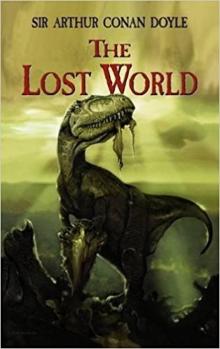 The Lost World
The Lost World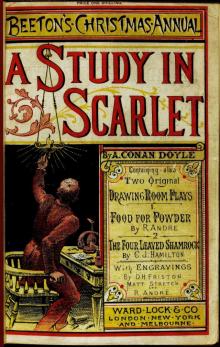 A Study in Scarlet
A Study in Scarlet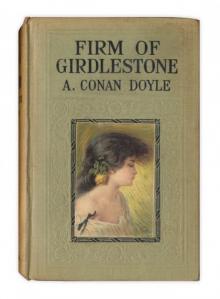 The Firm of Girdlestone
The Firm of Girdlestone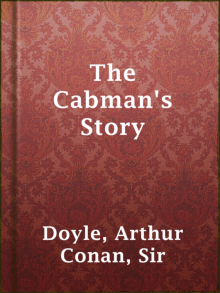 The Cabman's Story
The Cabman's Story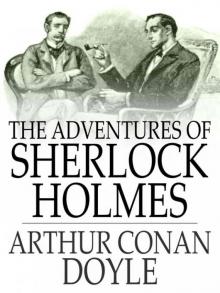 The Adventures of Sherlock Holmes
The Adventures of Sherlock Holmes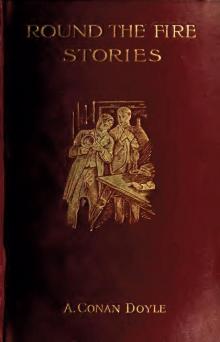 Round the Fire Stories
Round the Fire Stories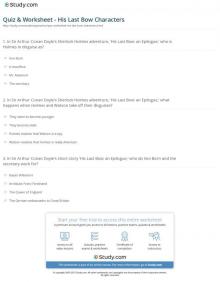 His Last Bow: An Epilogue of Sherlock Holmes
His Last Bow: An Epilogue of Sherlock Holmes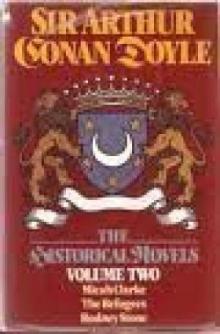 Micah Clarke
Micah Clarke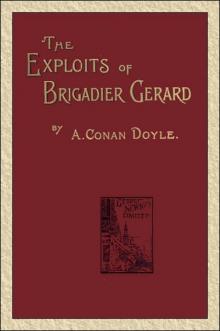 The Exploits of Brigadier Gerard
The Exploits of Brigadier Gerard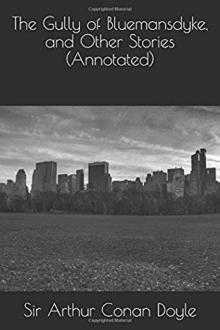 The Gully of Bluemansdyke, and Other stories
The Gully of Bluemansdyke, and Other stories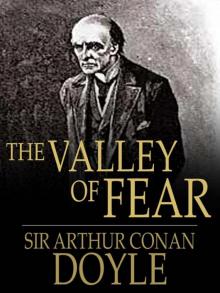 The Valley of Fear
The Valley of Fear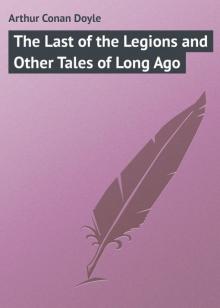 The Last of the Legions and Other Tales of Long Ago
The Last of the Legions and Other Tales of Long Ago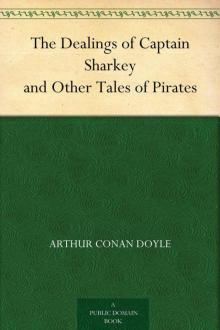 The Dealings of Captain Sharkey, and Other Tales of Pirates
The Dealings of Captain Sharkey, and Other Tales of Pirates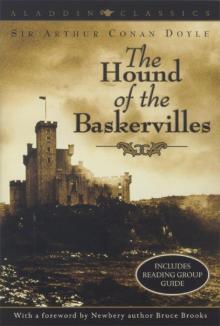 The Hound of the Baskervilles
The Hound of the Baskervilles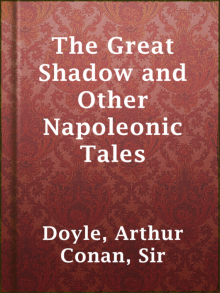 The Great Shadow and Other Napoleonic Tales
The Great Shadow and Other Napoleonic Tales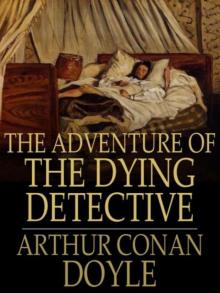 The Adventure of the Dying Detective
The Adventure of the Dying Detective The Man from Archangel, and Other Tales of Adventure
The Man from Archangel, and Other Tales of Adventure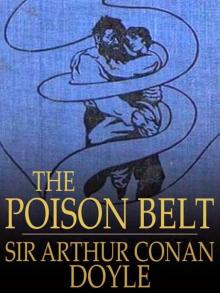 The Poison Belt
The Poison Belt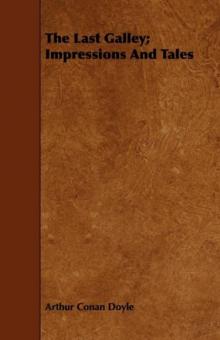 The Last Galley; Impressions and Tales
The Last Galley; Impressions and Tales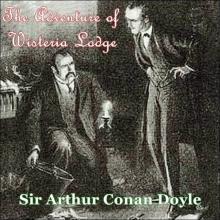 The Adventure of Wisteria Lodge
The Adventure of Wisteria Lodge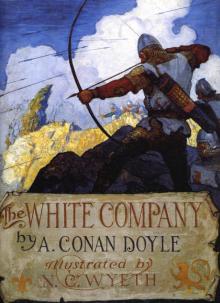 The White Company
The White Company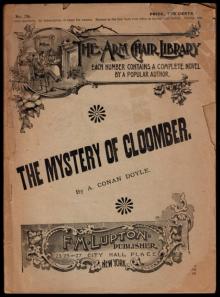 The Mystery of Cloomber
The Mystery of Cloomber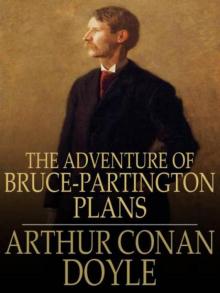 The Adventure of the Bruce-Partington Plans
The Adventure of the Bruce-Partington Plans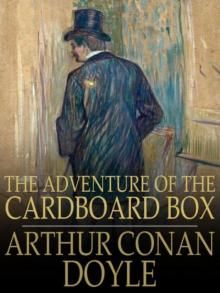 The Adventure of the Cardboard Box
The Adventure of the Cardboard Box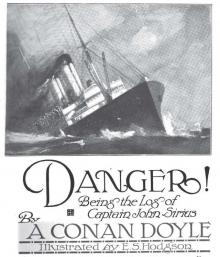 Danger! and Other Stories
Danger! and Other Stories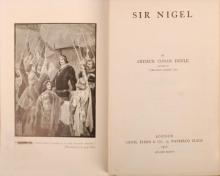 Sir Nigel
Sir Nigel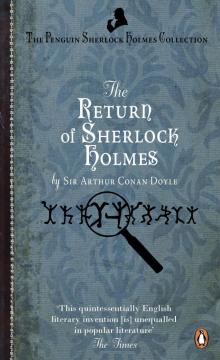 The Return of Sherlock Holmes
The Return of Sherlock Holmes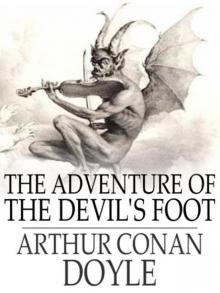 The Adventure of the Devil's Foot
The Adventure of the Devil's Foot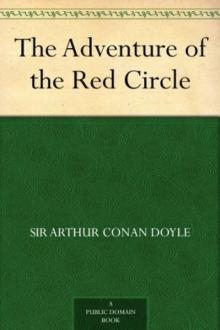 The Adventure of the Red Circle
The Adventure of the Red Circle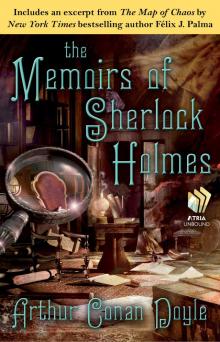 The Memoirs of Sherlock Holmes
The Memoirs of Sherlock Holmes The Adventure of the Yellow Face
The Adventure of the Yellow Face The Adventure of the Norwood Builder
The Adventure of the Norwood Builder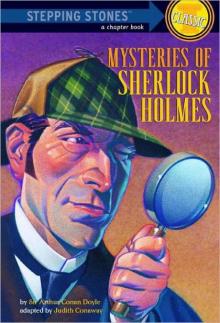 Mysteries of Sherlock Holmes
Mysteries of Sherlock Holmes The Adventure of the Missing Three-Quarter
The Adventure of the Missing Three-Quarter The Adventure of the Final Problem
The Adventure of the Final Problem A Scandal in Bohemia
A Scandal in Bohemia His Last Bow shssc-4
His Last Bow shssc-4 Beyond The City
Beyond The City The Adventure of the Gloria Scott
The Adventure of the Gloria Scott The Parasite
The Parasite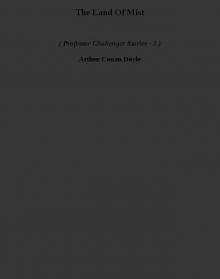 The Land Of Mist pcs-3
The Land Of Mist pcs-3 The Adventure of the Musgrave Ritual
The Adventure of the Musgrave Ritual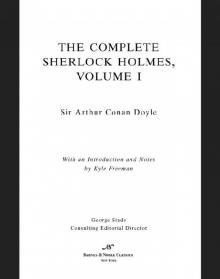 The Complete Sherlock Holmes, Volume I (Barnes & Noble Classics Series)
The Complete Sherlock Holmes, Volume I (Barnes & Noble Classics Series) The Adventure of the Stockbroker's Clerk
The Adventure of the Stockbroker's Clerk The Adventure of the Copper Beeches
The Adventure of the Copper Beeches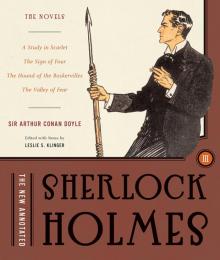 The New Annotated Sherlock Holmes
The New Annotated Sherlock Holmes When The World Screamed pcs-5
When The World Screamed pcs-5 The Adventure of the Six Napoleons
The Adventure of the Six Napoleons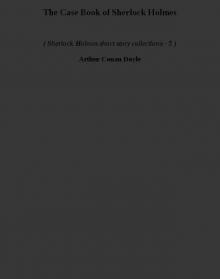 The Case Book of Sherlock Holmes shssc-5
The Case Book of Sherlock Holmes shssc-5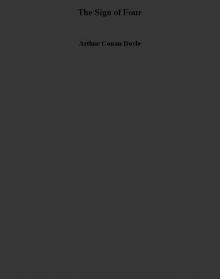 The Sign of Four
The Sign of Four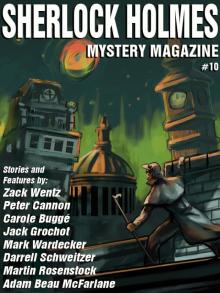 Sherlock Holmes Mystery Magazine #10
Sherlock Holmes Mystery Magazine #10 The Adventures of Brigadier Gerard
The Adventures of Brigadier Gerard The Adventure of the Second Stain
The Adventure of the Second Stain The Adventure of the Engineer's Thumb
The Adventure of the Engineer's Thumb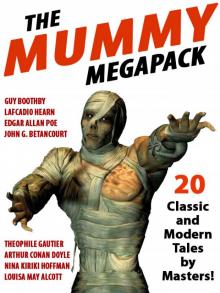 The Mummy Megapack
The Mummy Megapack The Disintegration Machine pcs-4
The Disintegration Machine pcs-4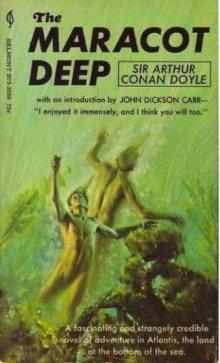 The Maracot Deep
The Maracot Deep The Five Orange Pips
The Five Orange Pips The Adventure of the Crooked Man
The Adventure of the Crooked Man The Adventure of the Blue Carbuncle
The Adventure of the Blue Carbuncle The Adventure of Silver Blaze
The Adventure of Silver Blaze The Adventure of the Solitary Cyclist
The Adventure of the Solitary Cyclist The Adventure of the Naval Treaty
The Adventure of the Naval Treaty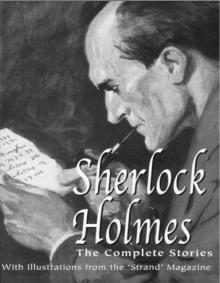 Sherlock Holmes. The Complete Stories
Sherlock Holmes. The Complete Stories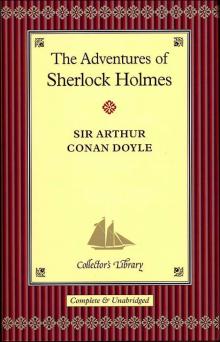 The Adventures of Sherlock Holmes (sherlock holmes)
The Adventures of Sherlock Holmes (sherlock holmes) The Adventure of the Empty House
The Adventure of the Empty House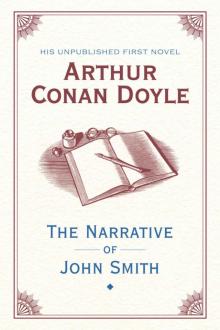 The Narrative of John Smith
The Narrative of John Smith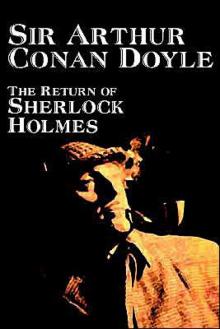 The Return of Sherlock Holmes (sherlock holmes)
The Return of Sherlock Holmes (sherlock holmes) The New Revelation
The New Revelation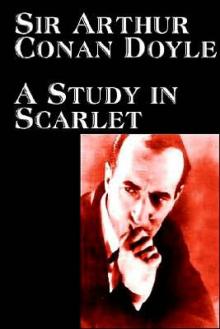 A Study in Scarlet (sherlock holmes)
A Study in Scarlet (sherlock holmes) The Vital Message
The Vital Message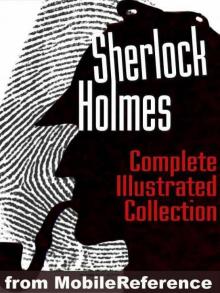 Sherlock Holmes Complete Collection
Sherlock Holmes Complete Collection Round the Red Lamp
Round the Red Lamp The Boscombe Valley Mystery
The Boscombe Valley Mystery The Adventure of the Beryl Coronet
The Adventure of the Beryl Coronet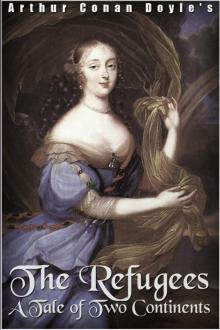 The Refugees
The Refugees The Adventure of the Three Students.
The Adventure of the Three Students.